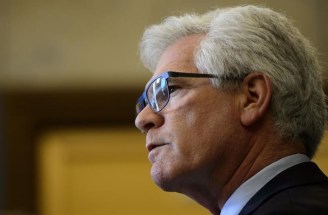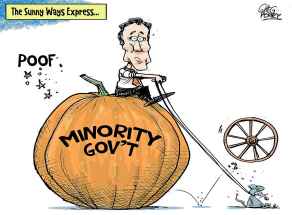‘Wexit’ is not a realistic solution
Read this article for free:
or
Already have an account? Log in here »
To continue reading, please subscribe:
Monthly Digital Subscription
$0 for the first 4 weeks*
- Enjoy unlimited reading on winnipegfreepress.com
- Read the E-Edition, our digital replica newspaper
- Access News Break, our award-winning app
- Play interactive puzzles
*No charge for 4 weeks then price increases to the regular rate of $19.00 plus GST every four weeks. Offer available to new and qualified returning subscribers only. Cancel any time.
Monthly Digital Subscription
$4.75/week*
- Enjoy unlimited reading on winnipegfreepress.com
- Read the E-Edition, our digital replica newspaper
- Access News Break, our award-winning app
- Play interactive puzzles
*Billed as $19 plus GST every four weeks. Cancel any time.
To continue reading, please subscribe:
Add Free Press access to your Brandon Sun subscription for only an additional
$1 for the first 4 weeks*
*Your next subscription payment will increase by $1.00 and you will be charged $16.99 plus GST for four weeks. After four weeks, your payment will increase to $23.99 plus GST every four weeks.
Read unlimited articles for free today:
or
Already have an account? Log in here »
Hey there, time traveller!
This article was published 25/10/2019 (2237 days ago), so information in it may no longer be current.
Failing to take a cue from either Great Britain’s torturous attempts to exit the European Union or Canada’s own experience with Quebec separatism, it seems a few agitators in Alberta want in on the action (or rather, out).
With most of the ridings in Alberta and Saskatchewan (and more than a few in Manitoba) going to the Conservatives on Oct. 21, the argument goes that if the West is going to prosper (read: get its oil to market/stick it to the eastern elites), it’s time to go its own way and leave Confederation. The name for this bold idea? “Wexit” — a portmanteau that seems straight out of a Bugs Bunny cartoon.
But if those pushing for a western exit from Canada want to be taken seriously, they’re going to have to do a bit better than “we voted differently; Ottawa just doesn’t understand us.”But if those pushing for a western exit from Canada want to be taken seriously, they’re going to have to do a bit better than “we voted differently; Ottawa just doesn’t understand us.”
And given that Canadians in British Columbia show no interest in taking part in this, that would leave at least one justification for separating cold. Without a coastline, the Wexit state would find itself negotiating with Canada — that is, Ottawa, where a separated Prairie bloc would have zero voice — to gain access to B.C. ports.
But what about Manitoba? Surely our northern coastline would solve that problem.
Not so fast. Manitoba Premier Brian Pallister, recently re-elected and heading a majority Tory government, threw cold water on that idea when asked.
“I don’t think you ever get anywhere building a stronger relationship by threatening to leave it… I think you have to work together. You have to overcome your difficulties,” Mr. Pallister said, adding: “You don’t threaten to leave. I’ve listened to that from Quebec for years, and I don’t like that.”

Speaking of Quebec and separatists, voters in La Belle Province also made their feelings known in the federal election, increasing the seats the Bloc Québécois holds in Parliament to 32. But it’s unlikely Quebecers will, as a province, hold yet another referendum on sovereignty. With Canada negotiating international trade deals, as well as contributing equalization payments, Quebec, like other Canadian provinces, benefits from being part of a larger country.
Not to put too fine a point on it, even Great Britain — a literal island kingdom apart from Europe but still, for centuries, economically and often dynastically intertwined with it — is finding making a dash for the Brexit anything but easy. Questions of how to regulate the Northern Ireland border without a shared membership in the EU pose problems. So, too, does a Scotland that could make its own break with England to remain in the EU. As The Scotsman newspaper recently reported, a majority of voters in Scotland and England think Brexit will mean a breakup of the U.K.
Similarly, would Alberta and Saskatchewan, themselves provinces only since 1905, be prepared to negotiate with First Nations unwilling to “Wexit” with them? To paraphrase the elder Trudeau, if Canada is divisible, so are the provinces.There are many voters in Western Canada frustrated with the way the Liberals have governed, and the name “Trudeau” conjures strong feelings about both the current prime minister as well as his father.
There are many voters in Western Canada frustrated with the way the Liberals have governed, and the name “Trudeau” conjures strong feelings about both the current prime minister as well as his father. But in terms of influence, the West can be proud of building a political party that demanded — and earned — a seat at the table.
Any talk of separating from Canada, in whatever form the fever dream takes, would be a sure path to less influence and less power for the West.










